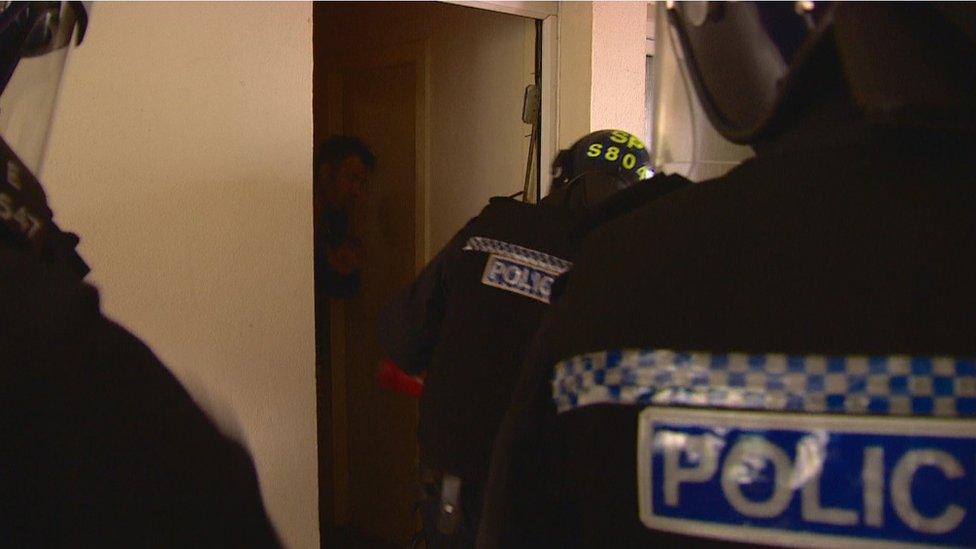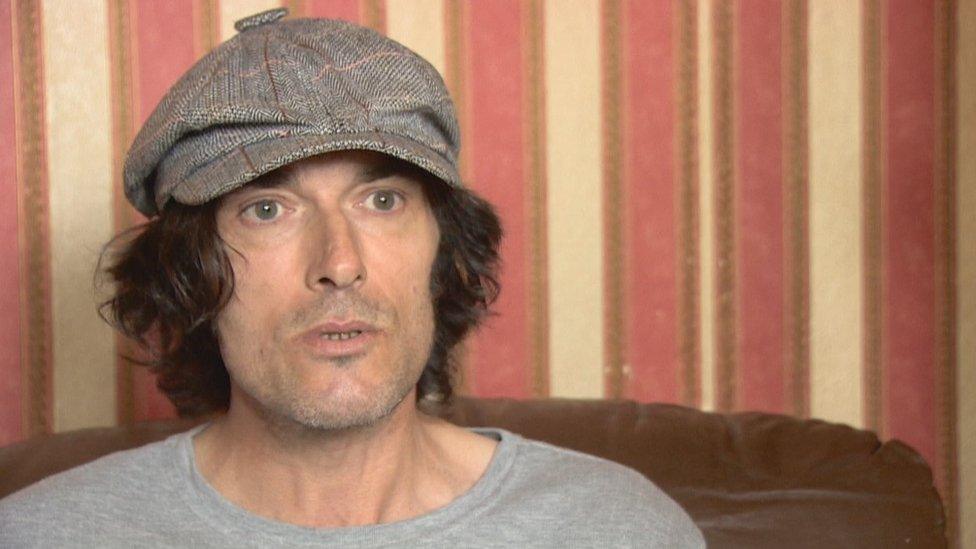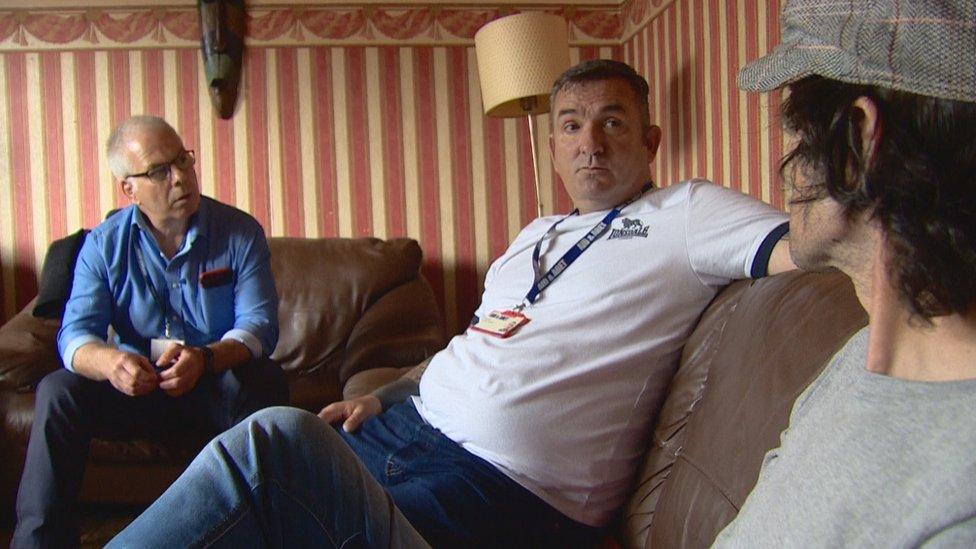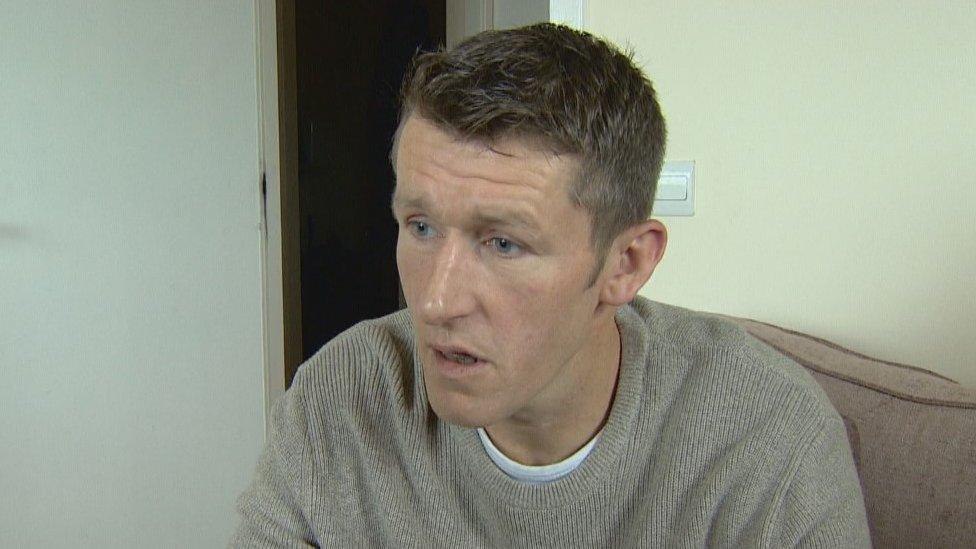Police and ex-addicts in Edinburgh team up for drugs fight
- Published

Former drug addicts and reformed criminals have teamed up with the police to try to reduce the number of fatal overdoses in Edinburgh.
For the last six months, members of an ex-offenders' group called Aid and Abet have been working alongside officers, tracking down high risk drug users and urging them to change their ways.
They are calling the approach "cops and cons".
It has been praised by drugs agency workers.
Their work is part of Operation Threshold, a police initiative to tackle drug related deaths in Scotland's capital.
The operation began earlier this year and culminated this week in a series of raids over three days across the city.
Drug supply
Police arrested 25 people and referred 31 to support services during three days of action to tackle drug crime and drug-related harm.
In the six month operation a total of 95 people, aged 16-58, have now been arrested on suspicion of drugs supply.
More than £1.2m worth of drugs have been recovered and more than £270,000 in cash.
However, senior officers readily acknowledge that drug busts alone will not stop people dying.
The prevention work with Aid and Abet preceded this week's enforcement action, and will continue after the police stop knocking down doors.
Their work is based on information shared by other agencies. When someone has narrowly survived an overdose, the Scottish Ambulance Service passes their name to the police, who give it to the outreach team, who then try to speak to the person involved.
Addicts find themselves talking to a highly sympathetic police officer in plain clothes, and someone who has been through addiction themselves. It appears to be an effective combination.

Last month Paul McLellan overdosed for the third time on 'street Xanax'
Last month Paul McLellan overdosed for the third time on "street Xanax." He survived, and was astonished when the team turned up at his door.
"It's really been a shock that they made contact with me," said the 43-year-old, who has lost two younger brothers to heroin.
"It showed that I'm going down a real bad path here, and I need to sort my situation out. What I was doing was really dangerous and could have led to my death, so I really had to address what I was doing."
Mr McLellan is still taking his prescription of methadone but he's stopped taking the pills that could have made him yet another statistic.
The two men who came to his door were Kevin Neary, co-founder of Aid and Abet, and police officer PC Graham Buchan from the VOW unit, a small team of officers originally set up to deal with repeat offenders.
Heavily tattooed and 6ft 3in, Mr Neary cuts an imposing figure. He said he was involved in the criminal justice system for three decades, was addicted to heroin and crack cocaine and spent many years in prison.

Police officer Con Graham Buchan (L) now works with ex-con, Kevin Neary (M)
When Mr Neary started working with PC Buchan, they discovered they had met many years before. PC Buchan was a member of an armed response unit which arrested Kevin for robbery in 2006.
The cop and ex-con are now knocking on doors, asking people who have nearly died from drugs how they can help them.
So far they have tracked down more than 60 high-risk users. Only one of the people referred to them has died, before they managed to speak to him.

Scott Richardson is being helped by the initiative
Another person they are working with is Scott Richardson, a former member of the Parachute Regiment who served in Iraq, Afghanistan and Northern Ireland. The 41-year-old said he went "off the rails" after leaving the Army.
Mr Richardson said: "They've saved my life basically, they've given me a new sense of purpose."
As they left his flat, PC Buchan asked if he could help Mr Richardson get a new phone, and offered to give him a lift to an appointment the next evening.
Operation Threshold follows a similar police operation in Dundee last year, and comes on the back of horrific figures for drug related deaths in Scotland.
In 2017, there were 934, the highest rate in the EU, and next month the figures for 2018 will be published. They are expected to exceed 1,000 for the first time.
'Social tragedy'
Det Supt Martin Maclean, of Police Scotland, said on a single day earlier this year, there were 12 suspected drugs deaths in Scotland in 24 hours.
He said: "That is a social tragedy for every family and loved one of somebody who dies from abusing drugs.
"That has risen inexorably over the decades and has risen to levels which is a massive public health problem. We see it as part of our job to try and do something about that."
The Scottish government is assembling a task force to tackle the rising number of deaths.
In Edinburgh, drug agency workers said the death toll has stabilised in the last two years, but it's showing no signs of falling.
Mr Neary said: "I've had two near death experiences with overdose myself.
"When you attend the funeral of someone and you hear the screams from the family, the mother or father burying their loved one, I've seen that myself, and it's not pleasant. For me it's about prevention."
Graeme Buchan said: "I always think people have something to offer. We're only a small country. We can't afford to lose 1,000 people a year from drugs."